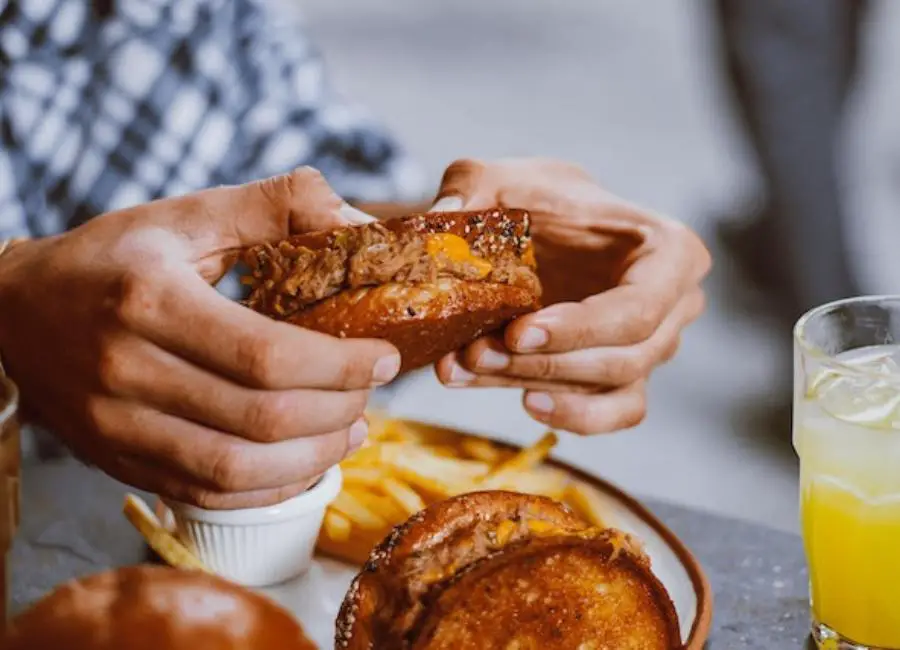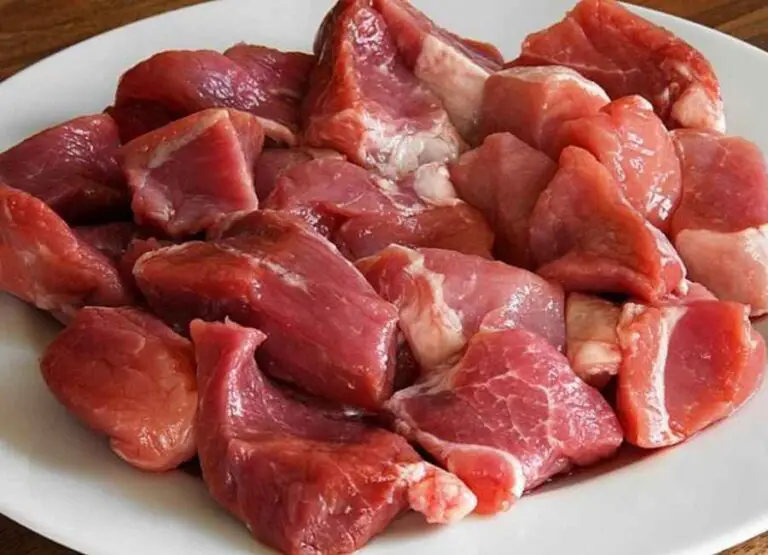9 Causes of Bloating After Eating Meat With Tips
Bloating after eating meat is a common experience that many of us have dealt with at some point. But what exactly causes this uncomfortable sensation? And is there anything we can do to prevent it? Don’t worry, we’ve got you covered!
In this short blog post, we’ll dive into the world of meat-induced bloating and give you some tips on how to keep your belly happy and healthy.
So, let’s get started!
What Causes Bloating After Eating Meat
Bloating after consuming meat can be caused by several factors, including the high amount of fat in the meat, the presence of lactose if the meat is processed, and the slow digestion of meat protein.
Some people may also have a hard time breaking down certain types of meats, leading to bloating and discomfort.
Let’s break it down further!
Bloating after eating meat can be caused by several factors. Here are some potential causes of bloating after consuming meat:
1. Excessive Fiber Content of the Meat
Excessive fiber content in meat can lead to bloating after eating. This can happen when the meat consumed is high in connective tissue or when there is added fiber in processed meat products.
The fiber in meat is difficult to break down and can cause gas and bloating as it passes through the digestive system.
How to address it: If excessive fiber content in meat is causing bloating, there are a few strategies to alleviate the symptoms:
- Choose lean cuts of meat: Opt for lean cuts of meat that have less connective tissue, such as chicken breast or lean cuts of beef or pork.
- Tenderize the meat: If you have a tough cut of meat that is high in connective tissue, tenderize it by marinating it or using a meat tenderizer before cooking. This can help break down the fibers and make it easier to digest.
- Cook the meat thoroughly: Properly cooking the meat can also help break down the fibers and make it easier to digest. Slow cooking or braising can be particularly effective for breaking down tough fibers.
2. High Fat Content of the Meat
High-fat content in meat can slow down digestion and lead to bloating. Fatty meats take longer to digest and can cause discomfort and bloating, especially if consumed in large quantities.
How to address it: To address bloating caused by high-fat meat:
- Choose leaner cuts: Opt for lean cuts of meat that have less fat, such as skinless poultry, lean beef, or pork loin. Trim visible fat from the meat before cooking.
- Limit portion sizes: Reduce the portion sizes of high-fat meats to avoid overloading the digestive system.
- Pair with lighter sides: If you choose to consume higher-fat meats, balance them with lighter sides, such as steamed vegetables or a salad, to help aid digestion.
3. Food Intolerances or Sensitivities
Food intolerances or sensitivities to certain components in meat can also cause bloating.
This can include lactose intolerance (if the meat contains dairy), gluten intolerance (if the meat contains gluten-containing ingredients), or specific sensitivities to certain proteins or additives in processed meats.
How to address it: If food intolerances or sensitivities are causing bloating after eating meat:
- Identify the trigger: Keep a food diary and note down the specific meat or ingredients that seem to cause bloating. This can help identify potential intolerances or sensitivities.
- Avoid trigger ingredients: Once identified, avoid or limit consumption of meats that contain the specific trigger ingredients.
- Seek medical advice: If you suspect a food intolerance or sensitivity, consult with a healthcare professional or registered dietitian for further evaluation and guidance.
4. Bacterial Contamination
Bacterial contamination in meat can lead to digestive issues, including bloating. Consuming meat that is contaminated with harmful bacteria, such as Salmonella or E. coli, can cause gastrointestinal symptoms and bloating.
How to address it: To reduce the risk of bacterial contamination in meat:
- Handle and store meat properly: Follow safe food handling practices, such as washing hands before and after handling raw meat, storing meat at appropriate temperatures, and avoiding cross-contamination with other foods.
- Cook meat thoroughly: Properly cook meat to kill any potential bacteria. Use a food thermometer to ensure meat reaches the appropriate internal temperature.
- Choose reputable sources: Purchase meat from reputable sources that prioritize food safety and adhere to proper handling and storage practices.
5. Lack of Digestive Enzymes
Some individuals may have a lack of digestive enzymes needed to break down certain components in meat, such as proteins or fats. This can lead to incomplete digestion and bloating.
How to address it: If a lack of digestive enzymes is causing bloating after eating meat:
- Consider enzyme supplements: Consult with a healthcare professional or registered dietitian to determine if digestive enzyme supplements may be beneficial in improving digestion.
- Try cooking methods that break down proteins: Certain cooking methods, such as marinating or slow cooking, can help break down proteins and make them easier to digest. Experiment with different cooking techniques to see if they alleviate symptoms.
- Eat smaller, more frequent meals: Consuming smaller, more frequent meals can help lighten the digestive load and make it easier for the body to digest meat.
6. Difficult-to-digest Proteins
Bloating after eating meat is often caused by difficult-to-digest proteins. Some proteins found in meat, such as gluten and lactose, can be challenging for the body to break down, leading to gas and bloating. Here are some ways to address this issue:
- Digestive enzymes: Taking digestive enzyme supplements that contain proteases can help break down proteins and improve digestion.
- Cooking methods: Opt for cooking methods that make the meat more tender and easier to digest, such as slow cooking or marinating.
- Choose lean cuts: Fatty cuts of meat can be harder to digest, so selecting lean cuts or trimming excess fat can help alleviate bloating.
7. Inadequate Hydration
Dehydration can also contribute to bloating after eating meat. When the body is not adequately hydrated, it retains water, leading to bloating and discomfort. Here’s how to address inadequate hydration:
- Drink enough water: Ensure you are drinking enough water throughout the day, especially before and after meals. The recommended daily water intake varies depending on factors such as age, sex, and activity level, but a general guideline is to aim for eight 8-ounce glasses of water per day.
- Limit dehydrating beverages: Reduce or avoid consuming dehydrating beverages such as alcohol, caffeinated drinks, and sugary beverages, as they can contribute to dehydration.
8. Sodium Overload
Consuming excessive amounts of sodium, which is commonly found in processed meats and cured meats, can lead to water retention and bloating. To address sodium overload:
- Read food labels: Check food labels for sodium content and choose lower-sodium options.
- Choose fresh meats: Opt for fresh, unprocessed meats instead of processed or cured meats, as they tend to have higher sodium levels.
- Limit condiments and seasonings: Be mindful of the condiments and seasonings you use when preparing meat, as many of them can be high in sodium. Consider using herbs, spices, and other flavorings instead.
9. Meat Combination with Other Food
Sometimes, bloating after eating meat can be attributed to how it is combined with other foods. Certain food combinations can lead to slower digestion and increased gas production. Here are some tips to address this:
- Separate high-starch foods: Avoid combining meat with high-starch foods like potatoes, rice, or bread in the same meal. Instead, try to have them in separate meals to promote better digestion.
- Eat smaller portions: Consuming smaller portions of meat and giving your body time to digest before consuming other foods can help prevent bloating.
- Consider food intolerances: If you consistently experience bloating after eating meat, you may have an underlying food intolerance. Consider speaking with a healthcare professional or registered dietitian to identify any potential intolerances and develop a suitable dietary plan.
Read more about bad smelling gas after eating meat.
How different types of meat may affect bloating after eating meat
The effect of different types of meat on bloating after consumption can vary. Some individuals may experience bloating more prominently after consuming red meat, such as beef or lamb, due to its higher fat content.
On the other hand, leaner meats like chicken or turkey may be less likely to cause bloating.
Processed meats, like sausages or deli meats, can be more problematic for some people due to their higher sodium and preservative content.
Additionally, individuals with certain digestive conditions, such as irritable bowel syndrome (IBS), may be more sensitive to certain types of meat and experience increased bloating.
It is essential to listen to your body and identify which types of meat may contribute to bloating for you personally.
Natural Remedies for Alleviating Bloating After Eating Meat
Bloating after eating meat can be uncomfortable and bothersome. There are several natural remedies that may help alleviate bloating after consuming meat.
Here are some natural remedies that may help:
Chew your food thoroughly
One of the simplest ways to prevent bloating after eating meat is to chew your food thoroughly. Chewing food properly helps break it down into smaller particles, making it easier for your body to digest. This can reduce the amount of gas produced during digestion and alleviate bloating.
Incorporate digestive enzymes
Digestive enzymes help break down food and facilitate digestion. Some people may have insufficient levels of certain digestive enzymes, such as lactase or protease, which can lead to bloating. Taking a digestive enzyme supplement before or with your meals, including those containing meat, may help improve digestion and reduce bloating.
Consume ginger
Ginger has been used for centuries to alleviate digestive issues, including bloating. It has natural anti-inflammatory properties that can help soothe the digestive system and relieve bloating. Drinking ginger tea or incorporating fresh ginger into your meals may help reduce post-meal bloating.
Try herbal teas
Certain herbal teas, such as peppermint tea or chamomile tea, have been traditionally used to alleviate digestive discomfort, including bloating. Peppermint tea can help relax the muscles of the gastrointestinal tract, promoting smoother digestion and reducing bloating. Chamomile tea has anti-inflammatory properties that may help soothe the digestive system.
Stay hydrated
Drinking an adequate amount of water throughout the day can help prevent bloating. Water helps keep the digestive system functioning properly and facilitates the movement of food through the intestines. Aim to drink at least 8 cups (64 ounces) of water per day, and adjust your intake based on your individual needs and activity level.
Consider probiotics
Probiotics are beneficial bacteria that can help maintain a healthy gut microbiome. They can aid in digestion and reduce bloating. Consuming probiotic-rich foods, such as yogurt, kefir, sauerkraut, or taking a probiotic supplement, may help alleviate bloating after eating meat.
Avoid overeating and eat smaller, more frequent meals
Overeating can put a strain on the digestive system and contribute to bloating. Instead of consuming large portions of meat in one sitting, consider eating smaller, more frequent meals throughout the day. This can help reduce the workload on your digestive system and minimize bloating.
Identify and avoid trigger foods
Certain foods may trigger bloating in some individuals. These can vary from person to person, but common culprits include beans, lentils, broccoli, cabbage, onions, and carbonated beverages. If you notice that certain meats or other foods consistently cause bloating, try eliminating them from your diet for a period of time and see if your symptoms improve.
Practice mindful eating
Eating mindfully can help promote better digestion and prevent bloating. Take your time to enjoy your meals, chew your food thoroughly, and pay attention to your body’s hunger and fullness cues. Eating in a relaxed environment and avoiding distractions can also contribute to better digestion.
It’s worth noting that these natural remedies may not work for everyone, and severe or persistent bloating should be evaluated by a healthcare professional.
Additionally, if you suspect that your bloating is caused by an underlying medical condition, it’s important to seek medical advice for proper diagnosis and treatment.
Strategies for Preventing Meat-Related Bloating
Bloating can occur after consuming meat due to various factors such as the type of meat, cooking methods, and individual digestion patterns. Here are some strategies that can help prevent meat-related bloating:
1. Choose lean meats: Opt for lean cuts of meat, as fatty meats can be harder to digest and may contribute to bloating. Lean proteins like chicken, turkey, and fish are generally easier on the digestive system.
2. Cook meats thoroughly: Ensure that meat is cooked thoroughly to kill any bacteria or parasites that could potentially cause digestive issues. Proper cooking also helps break down proteins, making them easier to digest.
3. Limit portion sizes: Eating large portions of meat in one sitting can put a strain on the digestive system. Consider moderating portion sizes and balancing them with other nutrient-rich foods like vegetables and whole grains.
4. Incorporate digestive aids: Adding digestive aids such as herbs, spices, and marinades can help enhance digestion and reduce the likelihood of bloating. For example, ginger, turmeric, and papaya contain enzymes that aid digestion.
5. Avoid processed meats: Processed meats like sausages, hot dogs, and deli meats often contain additives, preservatives, and high levels of sodium, which can contribute to bloating. It’s best to opt for fresh, unprocessed meats.
6. Practice mindful eating: Eating slowly and chewing food thoroughly can aid digestion by breaking down food into smaller particles. This allows the digestive enzymes to work more efficiently, reducing the chances of bloating.
7. Consider food combinations: Pairing meat with fiber-rich foods like vegetables and whole grains can help regulate digestion and prevent bloating. Fiber aids in smooth bowel movements and promotes a healthy digestive system.
8. Stay hydrated: Drinking an adequate amount of water throughout the day can help prevent constipation and promote regular bowel movements. This can contribute to reducing bloating associated with meat consumption.
9. Identify food intolerances or allergies: If you consistently experience bloating after consuming meat, it’s possible that you may have a food intolerance or allergy. Consider consulting with a healthcare professional or registered dietitian to identify any specific triggers.
Remember, everyone’s digestive system is unique, so it’s important to listen to your body and make adjustments based on your individual needs.
If bloating persists or is accompanied by other concerning symptoms, it’s advisable to seek medical advice.
Related Questions
How long does bloating last after eating meat?
The duration of bloating after eating meat depends on several factors, including the type of meat consumed, the amount consumed, and the person’s digestive system. In general, bloating caused by meat consumption can last for a few hours to a few days.
Can you prevent bloating after eating meat?
Yes, there are several ways to prevent bloating after consuming meat. You can start by choosing leaner cuts of meat and avoiding processed meats that contain lactose. Additionally, eating smaller portions and adding digestive enzymes to your diet can help break down the meat protein and reduce bloating.
Learn more about high protein and constipation.
What are other symptoms of bloating after eating meat?
In addition to bloating, other symptoms that may accompany meat-induced bloating include abdominal pain or discomfort, gas, and constipation. Some people may also experience nausea or heartburn.
Are certain types of meat more likely to cause bloating?
Yes, certain types of meat are more likely to cause bloating than others. For example, red meat, which is high in fat, is known to be more difficult to digest and can lead to bloating. Processed meats, such as sausages and hot dogs, can also cause bloating due to the presence of lactose and other additives.
When should I see a doctor for bloating after eating meat?
If your bloating after consuming meat is persistent or accompanied by other symptoms such as vomiting or unexplained weight loss, it is important to see a doctor. These symptoms may be indicative of an underlying health condition that requires medical attention.
Conclusion
In conclusion, we understand the discomfort that comes with bloating after eating meat. However, it’s essential to note that there are various ways to combat this issue.
From reducing your meat intake to cooking your meat correctly, simple lifestyle changes can make a significant difference.
Always prioritize your health, and don’t hesitate to seek medical attention if your bloating persists. Thank you for reading, and we hope you found these tips helpful. Happy eating!



![Can You Get Sick From Eating Old Hot Dogs [Hints]](https://foodcreeks.com/wp-content/uploads/2023/05/Can-You-Get-Sick-From-Eating-Old-Hot-Dogs-768x555.jpg)
![Why Do I Poop Multiple Times a Day [9 Reasons]](https://foodcreeks.com/wp-content/uploads/2024/03/IMG_COM_20240303_1534_26_2921-768x370.jpg)
![Do You Flip Meat When Smoking [Answered]](https://foodcreeks.com/wp-content/uploads/2023/02/Do-You-Flip-Meat-When-Smoking-768x555.jpg)

![Is Lunch Meat Processed Food [Answered]](https://foodcreeks.com/wp-content/uploads/2023/02/Is-Lunch-Meat-Processed-Food-768x555.jpg)